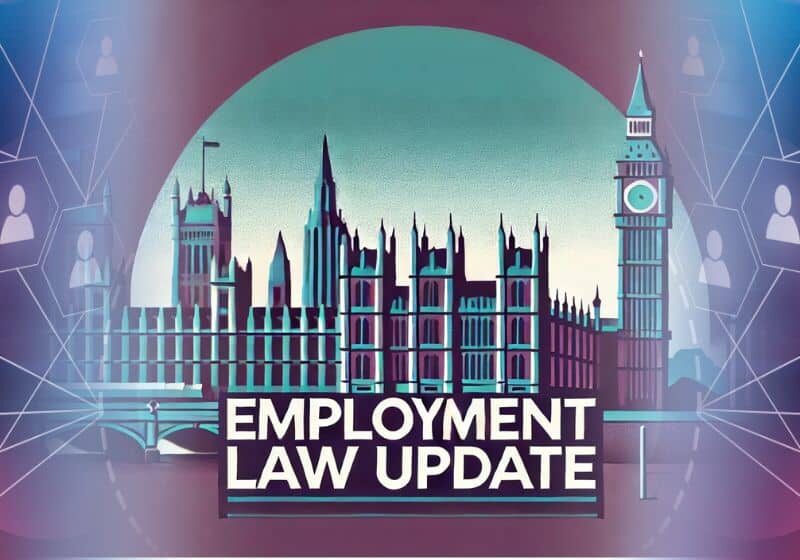HR Life After Labour’s landslide win

An Overview of Employment Legislation and Future Plans
Are you feeling overwhelmed by the impending wave of employment law changes set for 2024? Whether you find yourself feeling swamped by the new developments, tempted to put your head in the sand, or driven to stay ahead and be prepared, this article is here to help you understand these changes with confidence.
With the recent dissolution of Parliament, many of us are left questioning which legislative changes will stand, which will fall, and what the incoming government will bring. This year promised to be significant for employment law, with several key developments that could profoundly impact how we manage our teams and operations.
In this article, I will guide you through the essential updates on what has been ‘saved’ from the previous government, what has been lost, and what new policies we can expect from our new government. From the new statutory codes on ‘fire and rehire’ to the Paternity Leave (Bereavement) Act 2024, and Labour’s ambitious ‘Plan to Make Work Pay,’ you’ll gain a clear understanding of how these changes will impact your business and what you can do to prepare.
By addressing these pressing questions and providing a detailed overview, this article is aimed to equip you with the insights you need to confidently understand this evolving landscape. This isn’t just about staying informed; it’s about proactively positioning your business for success in a changing regulatory environment.
Legislation That Has Been Saved
Changing Employment Terms: ‘Fire and Rehire’
In 2022, the government announced a new statutory Code of Practice for the use of ‘fire and rehire’ practices, aimed at changing employees’ terms and conditions. This Code, published earlier this year, will apply when employers consider changes that might lead to dismissals and re-engagement of staff under new terms. It excludes genuine redundancy situations and will come into force on 18 July 2024.
Paternity Leave (Bereavement) Act 2024
The Paternity Leave (Bereavement) Bill received Royal Assent during the wash-up and is now the Paternity Leave (Bereavement) Act 2024. It will require further regulations to set out details, but once implemented, and we are anticipating the regulations to offer up to 52 weeks of leave for partners and fathers if the mother dies within the first year after birth or adoption.
Legislation Awaiting Commencement Orders
Several pieces of legislation have already been passed and are now Acts of Parliament, but they do not yet have specified dates for when they will come into force.
- Workers (Predictable Terms and Conditions) Act 2023: This Act allows workers to request a more predictable working pattern, applicable to those on fixed-term contracts of less than 12 months. Employers can deny requests based on business reasons similar to those for flexible working requests.
- Neonatal Care (Leave and Pay) Act: This Act allows up to 12 weeks of paid leave for employed parents of new-borns admitted to neonatal care, in addition to other leave entitlements.
Legislation That Has Fallen
Several bills that had moved past the first reading will not progress, including the Bullying and Respect at Work Bill, the Fertility Treatment (Employment Rights) Bill, and the Unpaid Trial Work Periods (Prohibition) Bill. These were all private member’s bills.
Status of Pre-Dissolution Consultations
The Conservative government initiated several consultations that are either ongoing or awaiting responses. These include:
- Reintroducing employment tribunal fees.
- Limiting non-compete clause durations in employment contracts.
- Reforming fit notes for long-term health conditions.
- Reforming TUPE to specify employee protection and simplify contract divisions in business transfers.
Labour’s Plan to Make Work Pay
The Labour Party’s ‘Plan to Make Work Pay’, published on 24 May 2024, promises substantial reforms to UK employment law. Labour aims to initiate legislative processes within 100 days of taking office, subject to consultation and parliamentary priorities. Here are 10 key proposals and their potential impact on employers:
- Single Status of ‘Worker’: Labour proposes creating a single status for all but the genuinely self-employed, aiming to simplify the framework and eliminate ‘bogus’ self-employment. This change would significantly impact employers with many ‘worker’ status staff by increasing employment rights and protections.
- Day One Right to Claim Unfair Dismissal: Labour intends to remove the two-year service requirement for unfair dismissal claims, allowing claims from the first day of employment. This change will necessitate more robust dismissal processes for employers.
- Enhanced Redundancy Consultation Requirements: Labour plans to trigger collective consultation based on the number of redundancies across the entire business rather than a single workplace, overturning the Woolworths case decision.
- Enhanced Protection against Dismissal for Maternity Returners: Labour will make it unlawful to dismiss a woman who is pregnant or within six months of returning from maternity leave, except in specific circumstances.
- Enhanced Pay Gap Reporting: Labour will require employers with over 250 employees to develop and publish action plans to close gender, ethnicity, and disability pay gaps, extending reporting requirements.
- Flexible and Zero-Hours Contracts: Labour intends to ban exploitative zero-hours contracts, ensuring contracts reflect regular working hours, with anti-avoidance measures and compensation for cancelled hours.
- Fire and Rehire: Labour aims to strengthen laws against fire and rehire practices, replacing the statutory code with stronger measures.
- Enforcement of Employment Rights: Labour will introduce a single enforcement body for workers’ rights and extend the time limit for bringing employment tribunal claims to six months.
- Right to Disconnect: Labour proposes a right to switch off, allowing workers to negotiate boundaries for work-related communications outside working hours.
- Increased Power of Trade Unions: Labour plans to strengthen trade unions, simplifying recognition processes, enhancing access to workplaces, and allowing electronic balloting for industrial action.
Timeline for Implementation
The Labour government has committed to starting the legislative process within 100 days of entering government, but new laws may not be in place immediately. Full consultation and legislative processes will be required, and some proposals may face delays or modifications. Historically, significant reforms, like the National Minimum Wage, took nearly two years to implement after Labour came into power in 1997.
Action Points for Employers
Understanding the ever-changing landscape of employment law can be daunting. As a business owner, it’s essential to stay ahead of these changes to ensure your business remains compliant and competitive. To help you prepare, here are some practical action points you can implement now to safeguard your business against upcoming employment law changes.
- Review Current Contracts and Policies
- ‘Fire and Rehire’ Code of Practice: Ensure your current employment contracts and policies comply with the new statutory Code of Practice for changing employment terms. Prepare for its enforcement on 18 July 2024.
- Plan for Paternity Leave (Bereavement) Act 2024
- Policy Updates: Update your paternity leave policies to include provisions for bereavement leave, anticipating the need for up to 52 weeks of leave under the new Act.
- Assess Impact of New Legislation
- Workers (Predictable Terms and Conditions) Act 2023: Prepare for requests from workers for more predictable working patterns. Evaluate how this will impact your scheduling and staffing.
- Neonatal Care (Leave and Pay) Act: Plan for the additional paid leave of up to 12 weeks for employees with new-borns in neonatal care.
- Prepare for Potential Legislative Changes
- Labour’s ‘Plan to Make Work Pay’: Conduct an internal audit to determine how proposed changes (e.g., single worker status, day one unfair dismissal rights) will affect your current workforce structure and financial planning.
- Strengthen Recruitment and Performance Management
- Hiring Practices: Improve recruitment processes to ensure better hiring decisions, minimizing the need for early-stage dismissals.
- Performance Reviews: Enhance performance management systems to address and document issues thoroughly, reducing the risk of unfair dismissal claims.
- Develop Redundancy Consultation Strategies
- Collective Consultation: Prepare for the possibility of needing to engage in collective consultation for redundancies across the entire business, not just individual sites.
- Enhance Maternity and Parental Support
- Dismissal Protection: Review and reinforce policies to support pregnant employees, those on maternity leave, and maternity returners, ensuring compliance with potential new protections against dismissal.
- Expand Pay Gap Reporting
- Data Collection: Start gathering and analysing data on ethnicity and disability pay gaps in anticipation of expanded reporting requirements. Develop action plans to address any identified disparities.
- Review Flexible and Zero-Hours Contracts
- Contract Adjustments: Evaluate the use of zero-hours contracts within your business. Plan for transitions to more predictable and secure contracts as proposed by Labour’s manifesto.
- Monitor Legislative Developments
- Stay Informed: Keep abreast of ongoing consultations and upcoming legislative changes. Regularly review government updates and adjust your policies accordingly.
Conclusion
As the new Labour party takes shape, employers should prepare for potential changes by reviewing current practices and assessing the impact of proposed reforms. Labour’s ‘Plan to Make Work Pay’ promises significant employment law changes, and proactive measures now can help mitigate future challenges. By taking these steps now, you can better position your business to adapt to new employment laws, ensuring compliance and fostering a supportive and fair workplace for your employees.
Angela Clay
A qualified employment law solicitor and our managing director, Angela has unparalleled legal expertise and decades of experience and knowledge to draw from. She’s a passionate speaker and writer that loves to keep employers updated with upcoming changes to legislation, and is a regular guest speaker on BBC Leicester Radio.




